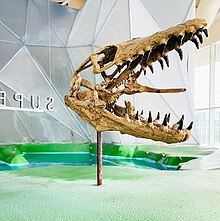User:Maydt4046/sandbox
Discovery World
[edit]
Discovery World is a nonprofit Science & Technology center in Milwaukee, Wisconsin. This museum is dedicated to inspiring the next generation of STEM majors through curiosity and creativity.
Focus
[edit]Mission
[edit]"Discovery World provides fun and educational experiences through interactive exhibits and educational programs for families and students in Milwaukee, the region, and the state of Wisconsin. We generate excitement for Science, Technology, Engineering, Math (STEM), freshwater education, and careers in the minds of children and young people, while playing a vital role in the workforce development pipeline." - Discovery World
History
[edit]Leadership
Exhibits
[edit]
Great Lakes Future
[edit]A model of the entire Great Lakes watershed built to scale. It addresses freshwater issues, stewardship, and the relationship between humans and freshwater resources. It also features an artificially-induced weather event. With the push of a button, visitors can call for "rain" to fall down upon this watershed, observing where the water flows, how run-off pollutants navigate the region, and more. The perimeter of the exhibit also features several tank habitats. Inhabitants include an Alligator Snapping Turtle, Tiger Salamanders, a Northern Spiny Softshell Turtle, an Ornate Box Turtle, a Three-Toed Box Turtle, a Blanding's Turtle, Red-eared Slider, North American Wood Turtles, a Corn Snake, a Bull Snake, Pumpkinseed, and Bluegill. Several ice-age and prehistoric animal skulls are found throughout the exhibit as well (i.e., Mosasaur skull).
Reiman Aquarium
[edit]The Reiman Aquarium is a large aquarium operation occupying the lower level of Discovery World. Tank exhibits replicate a wide variety of aquatic habitats, including that of Lake Michigan, Amazon Basin rivers, the Pacific and Atlantic Oceans, the Caribbean Sea, and the African Great Lakes.
Lake Michigan Tank
A 75,000 gallon cold freshwater tank that lays in the center of the aquarium. Dozens of other tanks follow a path around the exhibit. This tank is home to Lake and Shovelnose Sturgeon, Largemouth Bass, White and Black Crappie, Paddlefish, Northern Pike, Walleye, Freshwater Drums, Bowfin, Spotted, Longnose, and Shortnose Gar, Bigmouth and Smallmouth Buffalo, Channel Catfish, White Bass, and Common Carp, all of which are native to the Great Lakes. Aquarists and interns conduct one cleaning dive a week to manually scrub algae. Up to four divers will perform this task for around one hour.
"L" Tanks
The aquarists call these the "L" tanks due to their unconventional shape. These tanks occupy two levels, while tank glass penetrates the floor between these levels. This allows visitors to watch tank inhabitants swim beneath their feet.
- Great Lakes Comp Tank
- This is essentially a smaller, less diverse version of the Lake Michigan tank. This first of the two "L" tanks features Bluegill, Black Crappie, and Smallmouth Bass.
- North Atlantic Tank
- This North-Atlantic-simulating tank holds cold saltwater. This second "L" tank feature Striped Bass, Snowy Grouper, and Summer Flounder.
Amazon Basin River Tank
A freshwater Amazon Basin River system tank. This features a Silver Arowana, Bigtooth River Stingray, Blood Red Parrotfish, Black Ghost Knifefish, Jurupari, Marbled Angelfish and Motoro/Leopoldi hybrid Stingray. This large tank is placed in a corner from which an apron of glass extends out through the floor, allowing visitors to walk over and view tank inhabitants from beneath their feet.
Caribbean Tank
A 65,000 gallon warm saltwater tank. This is the most colorful and active tank and is displayed via an upside down halfpipe design, which can be walked through. This tank is home to a Rooster Hogfish, a Sargassum Triggerfish, two Bamboo Sharks, Goatfish, French and Queen Angelfish, a Cownose Stingray, a variety of Grunts, a Scrawled Filefish, and more.
Here, aquarists and interns also conduct one cleaning dive a week to scrub algae.

Touch Tanks
There are two touch tanks where visitors can have a hands-on interaction with some aquatic creatures.
A cold freshwater touch tank features young Lake Sturgeon who, when large enough, will be relocated to the larger Lake Michigan tank to join a larger, more diverse environment more appropriate for an adult sturgeon.
A much warmer saltwater touch tank features Atlantic Stingray and Cortez Round Stringray. Under employee supervision, kids and other visitors can learn how to responsibly interact with aquatic life.
Weird and Wild
The final hallway of the aquarium features several tanks with a handful of unique organisms. These include a South American tank, home to a Black Ghost Knifefish; an interesting relative to the Electric Eel which, too, can generate its own electric field. This is used to navigate its environment. A terrarium features several Blue Poison Dart frogs. In captivity, these frogs are not poisonous as they acquire their poison through bioaccumulation within their ecosystem. Another tank is home to the tiny freshwater Pea Pufferfish. To follow is a Piranha tank, an Axolotl tank, Cichlid tank, and Amazon tank. Finally is the tank holding a West African Lungfish, a primitive fish belonging to the lobe-finned fish class; Sarcopterygii. In addition to having fleshy, boned appendages, lungfish also have a modified air bladder used to gasp surface air, a useful trait when considering their native oxygen-deprived waters.
Experiences
[edit]---
Labs and Studios
[edit]---
Funding
[edit]---
References
[edit]---

